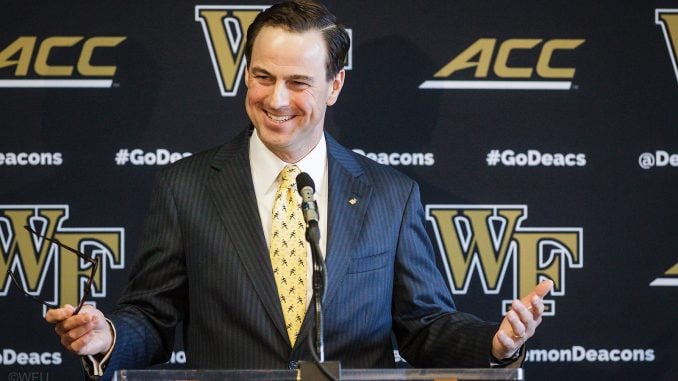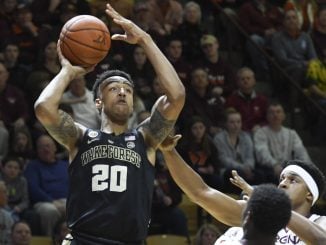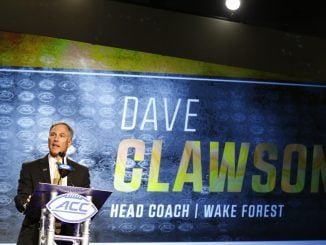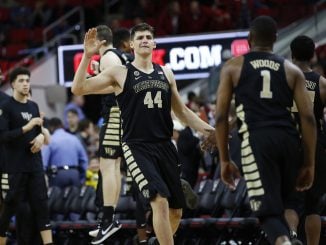
RALEIGH — Wake Forest has had only two athletic directors over the past 55 years, a continuity that is unprecedented in the “what have you done for me lately” world of college sports. So when Ron Wellman announced his retirement in March, it made sense that the Deacons would turn to one of their own to replace him.
John Currie began his career in athletic administration as an undergraduate intern under Wellman in 1993, and in the words of university president Nathan Hatch was “the perfect fit to follow in the footsteps of his mentor.”
The 47-year-old Chapel Hill native inherits a program that is, for the most part, in solid shape. But that doesn’t mean the job is without its challenges, not the least of which is an eventual decision about the future of men’s basketball coach Danny Manning.
Currie discussed that and a wide range of other issues in a recent interview with the North State Journal:
NSJ: You’ve been on the job for a little over a month now. Have you settled in yet?
JC: I haven’t spent much time in the office. I’ve mainly been out and about in the department and out visiting with our other constituents around our campus and across the state. I was named on March 4 and started officially on May 1, so I’ve been doing a lot of individual meetings. In one week, I think it was my third week on the job, I flew to Orlando for two days of semifinals in NCAA tennis then flew to Arkansas for the semifinals and finals of NCAA women’s golf. We finished second in both, but even though it was disappointing not to win it’s not a bad thing to be No. 2 out of 350-some Division I schools.
NSJ: How has Wake Forest changed since you first arrived as a freshman in 1989?
JC: Thirty years ago this fall I came to Wake Forest and I spent 10 years here. Then I went to Tennessee for 10 years and eight years at Kansas State. To come back here after 20 years away is very special for lots of reasons. There are actually two business schools that have been built since I left. Certainly, there’s been a lot a tremendous amount of development under Ron Wellman’s leadership in our athletic facilities. We have spectacular facilities that are as good an infrastructure as anyone in the country and certainly as anyone in our state.
NSJ: With Wake Forest being something of an outlier among the Big Four because of its size and location, how do you overcome those issues and keep your program from lagging behind those at UNC, NC State and Duke?
JC: One of the cool things about the modern era is that we can be everywhere. Wake Forest’s alumni footprint is a worldwide footprint, even though it’s historically anchored in North Carolina. When you mention Big Four, that’s near and dear to my heart. I grew up on Tobacco Road (in Chapel Hill) and I understand the competition between these schools, and we’re going to pay attention to that. This year, for the first time since 1921, Wake Forest will host Carolina, NC State and Duke in football all in the same year. We’re using that as an opportunity to remind people of what the Big Four means. The tremendous growth of the Triangle means that Wake Forest people have grown with it. Wake Forest alumni, friends, parents, fans, prospective students and student-athletes, the Raleigh market — along with Charlotte — are very important to our university like they are to everybody else.
NSJ: How do you get those people to support the Deacons by coming to games, since attendance annually ranks either last or next to last in the ACC in both football and men’s basketball.
JC: We’ve got a really big focus on our grassroots fanbase and reminding folks that you don’t have to graduate from Wake Forest to be a Wake Forest fan, just like you don’t have to graduate from Chapel Hill to be a Carolina fan. We’re actively promoting that. Sometimes we talk about being the front porch of the university, but I think that’s a little overused. Coming to athletic events at Wake Forest should reflect the hospitality of our university. So one of the things that’s an advantage is that our facilities are easy to get to. We welcome people from around the state and around the region to come spend the day with us, drink a cold beer and watch the Deacons.
NSJ: Since you mentioned it, the issue of beer sales at college sports events is a hot topic these days. But Wake has been doing it for years. How is that working out?
JC: It’s all about fan experience, and being able to buy a cold beer at a ballgame is something that some people like. Some people don’t care for it and they don’t have to partake. It’s on us to run a responsible event, and we’ve had zero problems since Wake Forest began offering that amenity.
NSJ: The Deacons’ first three football games this season are on Friday nights, including two of them at home. Is that something you’d like to continue under your watch?
JC: Our preferred day for college football is always going to be on Saturday. The reality of the past 30 years in college football is that the ability to have games on Thursday nights and on some rare occasions Friday nights has been good for the game from an exposure standpoint. Frank Beamer built his program’s notoriety at Virginia Tech by playing those awesome Thursday night environment games. I think there’s a place for that. Not everyone can come on Saturday at noon. That’s not the best time either, especially early in the year versus playing at 7 o’clock at night. But certainly, our preferred day is still Saturday.
NSJ: Having spent 10 years Tennessee, an SEC school, how does that league compare to the ACC?
JC: I’ve got 26 years in three leagues — the ACC, the SEC and the Big 12. There are certainly different nuances to all of them. From a conference level, all three have great interrelationships between their schools. Fans in this league have as good a perspective as anyone in the country. From a Wake Forest perspective, our fans have spoken loud and clear that the academic integrity of the student-athlete experience is very important, as is compliance integrity and safety. We will never compromise on those standards in the pursuit of victory. The good thing, we’ve shown at Wake Forest, is that those two things are not incongruent. You look at Wake Forest under Dave Clawson’s leadership, we’re among the top 10% of programs in academic performance and we’ve won three bowl games in a row.
NSJ: Outside of men’s basketball, you’re taking over an athletic department that appears to be thriving. Does that make your transition any easier?
JC: We are very fortunate at Wake Forest. I’m not replacing Ron Wellman. I’m just the next up after 27 years of Ron’s incredible leadership with followed 28 years under Dr. Gene Hooks. Our president, Dr. Nathan Hatch, has been a remarkable leader not just for Wake Forest, but the Atlantic Coast Conference in terms of adding more to the student-athlete experience and the value of a scholarship. We want to continue to build on this foundation of excellence, and we’ve got some real opportunities.
NSJ: How much have you leaned on Ron during your transition?
JC: Ron set the foundation I’ve practiced my whole career. He was by the office the other day. We have a pattern of getting together, and I know he’s only a phone call or text away.”
NSJ: How much say did you have in the decision to retain Danny Manning, or was that call made by Ron before you got here?
JC: Ron is the best person to evaluate where the program is and was at that time. As he said at the press conference on March 4, that would be his evaluation. He did talk about things with me and we’ve had a great passing of the torch joint meeting with Coach Manning. Since then I’ve spent quite a bit of time talking to Coach Manning. It’s been quite a bit of fun getting to know him better and learning about the program. All of us want the same thing. Where Wake Forest is in men’s basketball right now is not the Wake Forest standard from an on-court standpoint. The bottom line is that we’ve got to get better.
NSJ: Were you surprised at the backlash that surrounded your attempt at hiring Greg Schiano at Tennessee? What did you learn from that experience?
JC: Ultimately, I’m really proud of what we accomplished in my time at Tennessee. I spent 10 years there and have a lot of friends there. We got a lot of good things done. That situation was really unprecedented in college sports. We dealt with that in the best manner we could and continued to operate with honor and integrity with our student-athletes’ best interests in mind.



